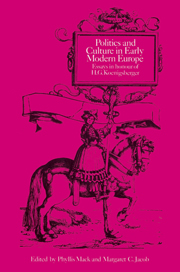Book contents
- Frontmatter
- Contents
- Introduction
- The court of the Spanish Habsburgs: a peculiar institution?
- The magnificent Lorenzo de' Medici: between myth and history
- Political rhetoric and poetic meaning in Renaissance culture: Clément Marot and the Field of Cloth of Gold
- The unlikely Machiavellian: William of Orange and the princely virtues
- The Estates of Brabant to the end of the fifteenth century: the make-up of the assembly
- Presents and pensions: a methodological search and the case study of Count Nils Bielke's prosecution for treason in connection with gratifications from France
- Between Bruni and Machiavelli: history, law and historicism in Poggio Bracciolini
- Constitutional discourse in France, 1527–1549
- Lieuwe van Aitzema: a soured but knowing eye
- John Calvin's contribution to representative government
- Luther and the humanists
- Scholars and ecclesiastical history in the Early Modern period: the influence of Ferdinando Ughelli
- ‘By an Orphean charm’: science and the two cultures in seventeenth-century England
- The crisis of the European mind: Hazard revisited
- Isaac Beeckman and music
- Decadence, shift, cultural changes and the universality of Leonardo da Vinci
- Bibliography of the writings of HELMUT GEORG KOENIGSBERGER
- Index
The crisis of the European mind: Hazard revisited
Published online by Cambridge University Press: 20 October 2009
- Frontmatter
- Contents
- Introduction
- The court of the Spanish Habsburgs: a peculiar institution?
- The magnificent Lorenzo de' Medici: between myth and history
- Political rhetoric and poetic meaning in Renaissance culture: Clément Marot and the Field of Cloth of Gold
- The unlikely Machiavellian: William of Orange and the princely virtues
- The Estates of Brabant to the end of the fifteenth century: the make-up of the assembly
- Presents and pensions: a methodological search and the case study of Count Nils Bielke's prosecution for treason in connection with gratifications from France
- Between Bruni and Machiavelli: history, law and historicism in Poggio Bracciolini
- Constitutional discourse in France, 1527–1549
- Lieuwe van Aitzema: a soured but knowing eye
- John Calvin's contribution to representative government
- Luther and the humanists
- Scholars and ecclesiastical history in the Early Modern period: the influence of Ferdinando Ughelli
- ‘By an Orphean charm’: science and the two cultures in seventeenth-century England
- The crisis of the European mind: Hazard revisited
- Isaac Beeckman and music
- Decadence, shift, cultural changes and the universality of Leonardo da Vinci
- Bibliography of the writings of HELMUT GEORG KOENIGSBERGER
- Index
Summary
It is now fifty years since the brilliant French historian, Paul Hazard, published in 1935 his classic work, La crise de la conscience européenne 1680–1713 (Paris, 1935). In it he propounded a thesis that has admirably withstood the passage of time and been capable of absorbing many, but by no means all, of the historical studies appearing since the Second World War. Briefly stated, Hazard and all subsequent historians have discerned at the end of the seventeenth and the beginning of the eighteenth centuries a crisis within the European mind, a moment of profound uncertainty, une zone uncertaine, malaisée. Out of that crisis emerged a new understanding of people and nature, of government, of religion in society which, as he saw it, prepared the way for the French Revolution. At that moment emerged a mentalité discernibly enlightened and modern, one with which Hazard and his generation of liberal French intellectuals could still identify.
Hazard identified one of those extraordinary cultural shifts – simultaneously the decline of traditional religious culture and the rise of a culture discernibly secular – which have so fascinated cultural historians. Helli Koenigsberger speculated about one such transformation within sixteenth-century Venetian culture. Here I seek to explore the nature of Hazard's crisis, accepting his model of its being a critical turning point in European culture but offering a new reading of its origins and resolution.
- Type
- Chapter
- Information
- Politics and Culture in Early Modern EuropeEssays in Honour of H. G. Koenigsberger, pp. 251 - 272Publisher: Cambridge University PressPrint publication year: 1987
- 6
- Cited by



